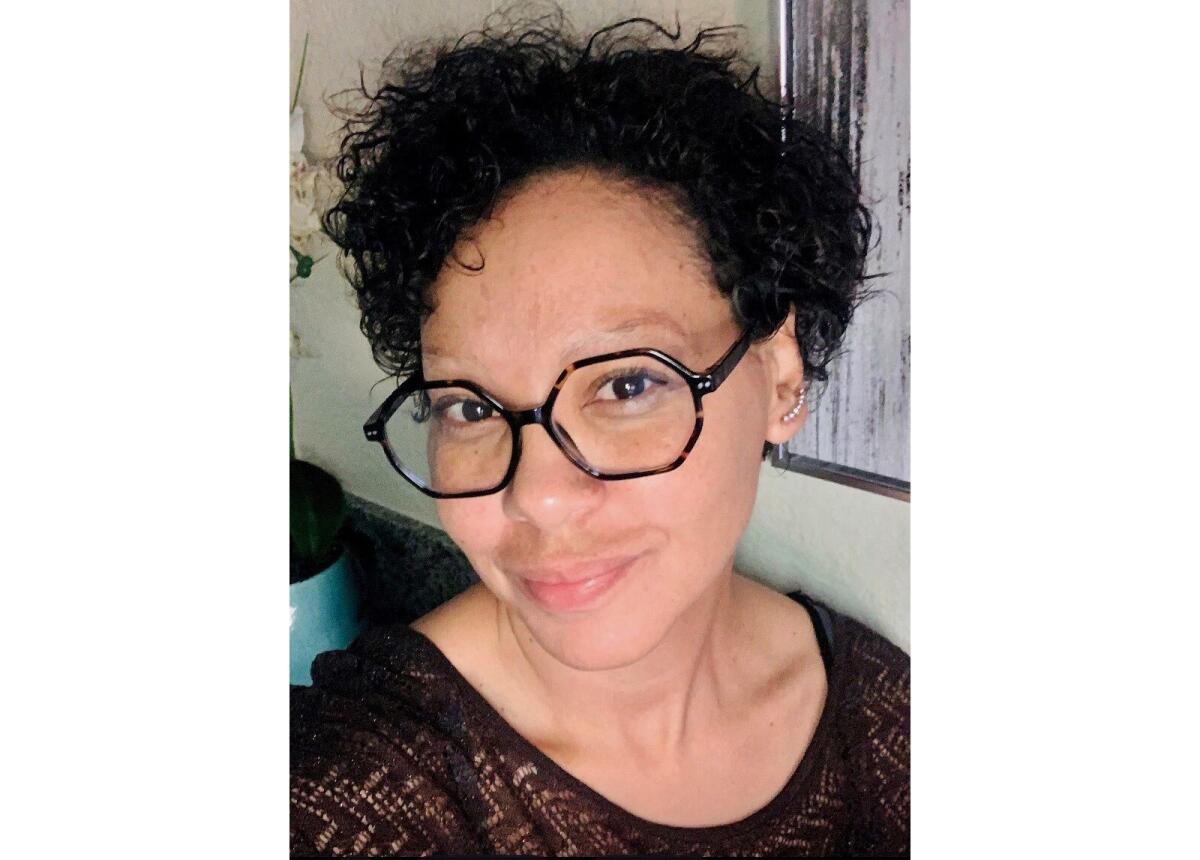Column: She killed the man who trafficked her. Will California ever forgive her?

Sara Kruzan makes sure her daughter Summer Reign-Justice never wants for ice cream, because it was a triple dip of mint chip and rocky road that led Kruzan to murder and prison.
But she also wants to make sure Summer has something more substantial to protect her future: a pardon for Kruzan from Gov. Gavin Newsom so Summer can grow up knowing that we, the people of California, forgive her mother’s crimes and acknowledge the indifference and racism on our part that allowed Kruzan to be treated like a throwaway Black girl.
Why she hasn’t received that pardon is a mystery to me.
Kruzan was 11, poor and abused, walking home in the speck of a place known as Rubidoux, in Riverside County, when a man pulled up beside her in a red Mustang and offered to buy her that ice cream. She’d never seen a car like that, and the thought of the cool treat on the hot day was irresistible. Better than going home and being punched in the face by her mom, anyway.
By the time Kruzan was 13, George Gilbert “G.G.” Howard, the 31-year-old man in the Mustang, was her abusive pimp, forcing her to have sex with 11 men on her first night on the streets in Hollywood and Orange County. Over the next years, he hurt her, sold her, and left her feeling like she was unable to inhabit her own body and unable to escape it.
Thinking she’d found true love with a man named Johnny, and fearful of his ex-con uncle, she agreed to help them rob Howard. But everything went wrong, and Kruzan ended up shooting and killing Howard in the honeymoon suite of a cheap motel, where Howard had been about to sexually assault her with a painful massage tool that he had used on her many times before. She was so scared and shocked after she fired the gun that she fled barefoot, leaving her purse behind.
Horrifying? Yes. But what happened next may be worse — because it’s on us.
Within weeks, police arrested her. Tried as an adult, she was sentenced to life in prison without parole in 1995, for a crime she committed when she was 16. The court refused to allow any evidence of her abuse — at that time, defenses including battered women’s syndrome did not yet exist for cases like hers.
And it wasn’t until 2017 that California stopped arresting children for prostitution. Before that change in law, California often considered trafficked children to be willing sex workers — especially the Black and brown girls who make up a high percentage of those forced onto the streets. For decades, this state, and this country, has ignored the prison pipeline that locks up girls for being victims of abuse and trafficking, and for having the audacity to fight back. So Kruzan was just considered a child prostitute, and a murderess who robbed and killed her trafficker.
Kieana Aldrich was 17 when sent to prison. Her mental health has deteriorated behind bars, but the coronavirus has cut off nearly all help.
Kruzan’s first bit of mercy came from then-Gov. Arnold Schwarzenegger on his final Sunday in office in 2011, when he commuted her sentence to 25 years with the possibility of parole.
She was released two years later in 2013, after a Riverside County judge reduced her charges to second-degree murder and cut her sentence to about 16 years, which she had served.
After spending almost 19 years in jail and prison, Kruzan was free at age 35.
Well, sort of free. Because that conviction hangs over her head like the Sword of Damocles — making it hard to get on with her life and always, somehow, bringing more instability and pain to her, and to Summer.
It shows up in the obvious ways, like when she tries to get an apartment or a job and the background check turns into a giant roadblock. She’s pushed ahead anyway, becoming a national advocate for reforming laws that let kids be treated like adults, and that ignore the abuse of trafficking when it comes to sentencing. This month, her memoir, “I Cried to Dream Again,” was released, detailing with scorching honesty what she has been through.
But nothing she does seems enough to overcome that night in the hotel room, she said. It’s the psychic burden that weighs on her, a different kind of prison, a poison to her ambition and well-being.
“I feel like I have just kind of built my life on this quick sand, repeating patterns, repeating trauma,” she told me. “Definitely I don’t trust a lot of people.”
It is grief and torment that Romarilyn Ralston understands. Like Kruzan, she was convicted of murder and served more than two decades. She was released in 2011.
In January, sitting in her office at Cal State Fullerton where she is director of a program for formerly incarcerated people, she received a call she thought was a prank. The man on the phone said he was Newsom.
Sure, she said. No, really, he told her. He was calling to let her know he had signed her pardon.
Until that moment, she didn’t fully understand what it would mean to her, she said.
“I was able to help so many people, but I could not help myself in getting past the burden for the crime that I had committed, and the family [of the victim] that I feel like I broke apart, until the day the governor called,” she told me recently. “And I think that was the last piece that I needed to really free me in my heart and in my soul. It didn’t change my life, it doesn’t exonerate me from what I’ve done, it doesn’t expunge my record, but it did something for my soul, and I think Sara needs that too.”
Ralston said she was surprised by how much the clemency meant to her family as well, relieving them of a weight too. She thinks Summer deserves the freedom of a pardon as much as her mom — so we don’t pass the trauma of our callousness on to another generation.
“The message [now] is that your mom is a monster. And she’s not a monster, she’s human. And human beings hurt people and we make mistakes and it’s terrible, but the beauty about being human is that we are able to overcome it and transform our lives and allow our true human spirit to thrive,” said Ralston. “I think without the pardon, [Kruzan’s] human spirit is going to forever be in pain, because mine was.”
After nearly a decade in prison for crimes related to being sex trafficked as a minor, Keiana Aldrich was released Thursday night
I asked the governor’s office about Kruzan, but it won’t comment on the clemency process.
I will, though: It’s political. In an election season where one of the few issues that seems to have any traction against Newsom or Democrats is crime, pardoning murderers probably isn’t high on the governor’s to-do list.
Kurzan’s pro bono legal team is also asking Riverside County Dist. Atty. Michael Hestrin to look at the case and possibly ask the court to overturn the conviction. A spokesman for Hestrin said he couldn’t comment on that request, because the DA’s Conviction Review Committee is considering it. Hestrin is also running for reelection, in a county that loves tough-on-crime politicians.
So the deck is once again stacked against Kruzan, because the system has larger concerns than the fate of one formerly incarcerated woman and her first-grade daughter. Or at least larger to some.
But Kruzan is struggling. If you asked me to describe her in one word, it would be vulnerable. She needs help, and needs to know that we see her for the woman she has become. She doesn’t need it when the elections are over, or when it’s convenient for us. She needs it now.
She is trying to focus on making sure Summer knows “she has a home, that mom is going to be right there with her,” and she is trying to keep her faith that the arc of the moral universe does bend, if not to justice, to better days.
She asked that whatever I write, I include Jeremiah 29:11, a Bible quote that has kept her together since prison: “For I know the plans I have for you,” declares the Lord, “plans to prosper you and not to harm you, plans to give you hope and a future.”
Summer is 7, and she will grow up knowing all the hard details of her mom’s life — there is no shelter from Google. But a pardon reshapes that story, gives it a new end and offers a new beginning — for Kruzan and for California.
Summer Reign-Justice deserves nothing less.
More to Read
Sign up for Essential California
The most important California stories and recommendations in your inbox every morning.
You may occasionally receive promotional content from the Los Angeles Times.












